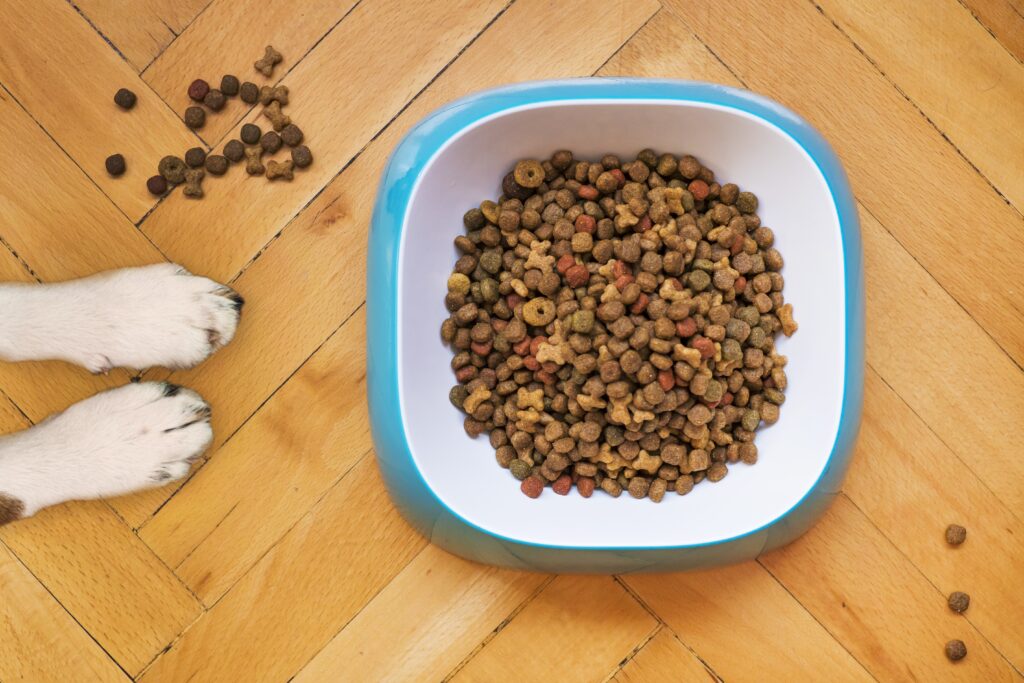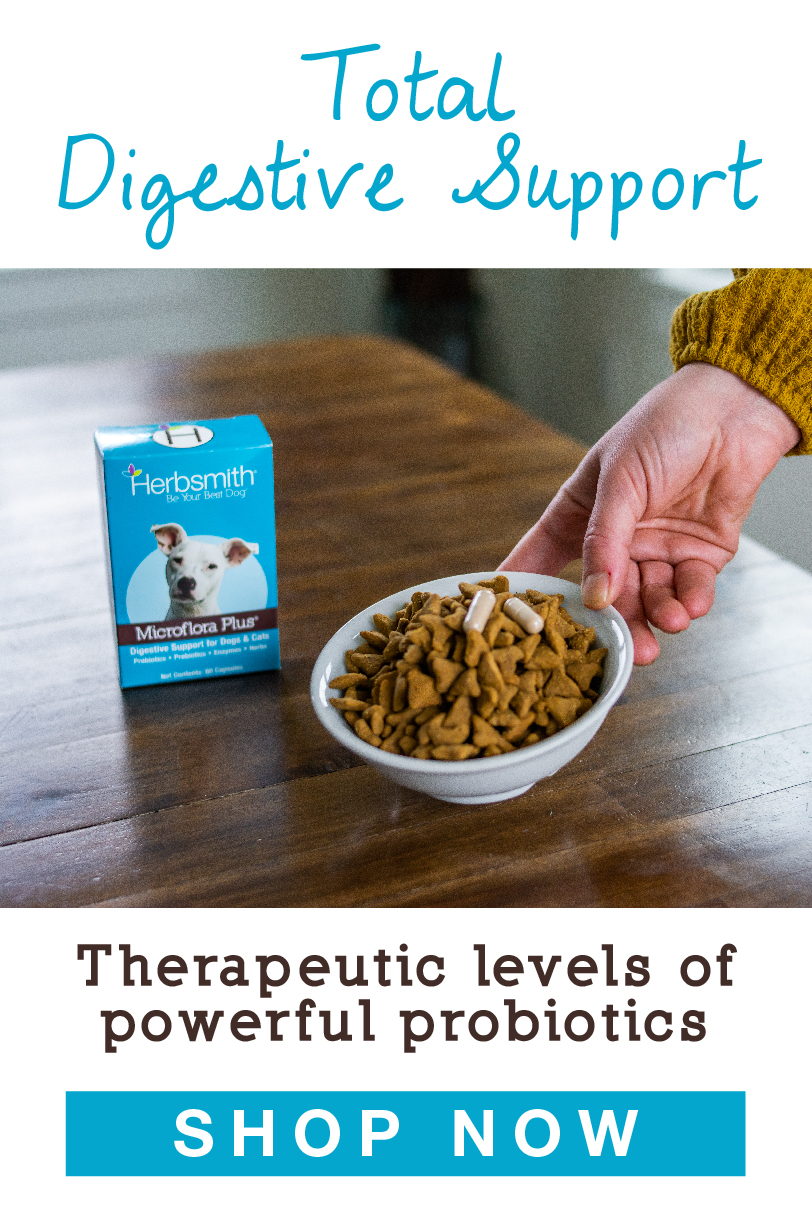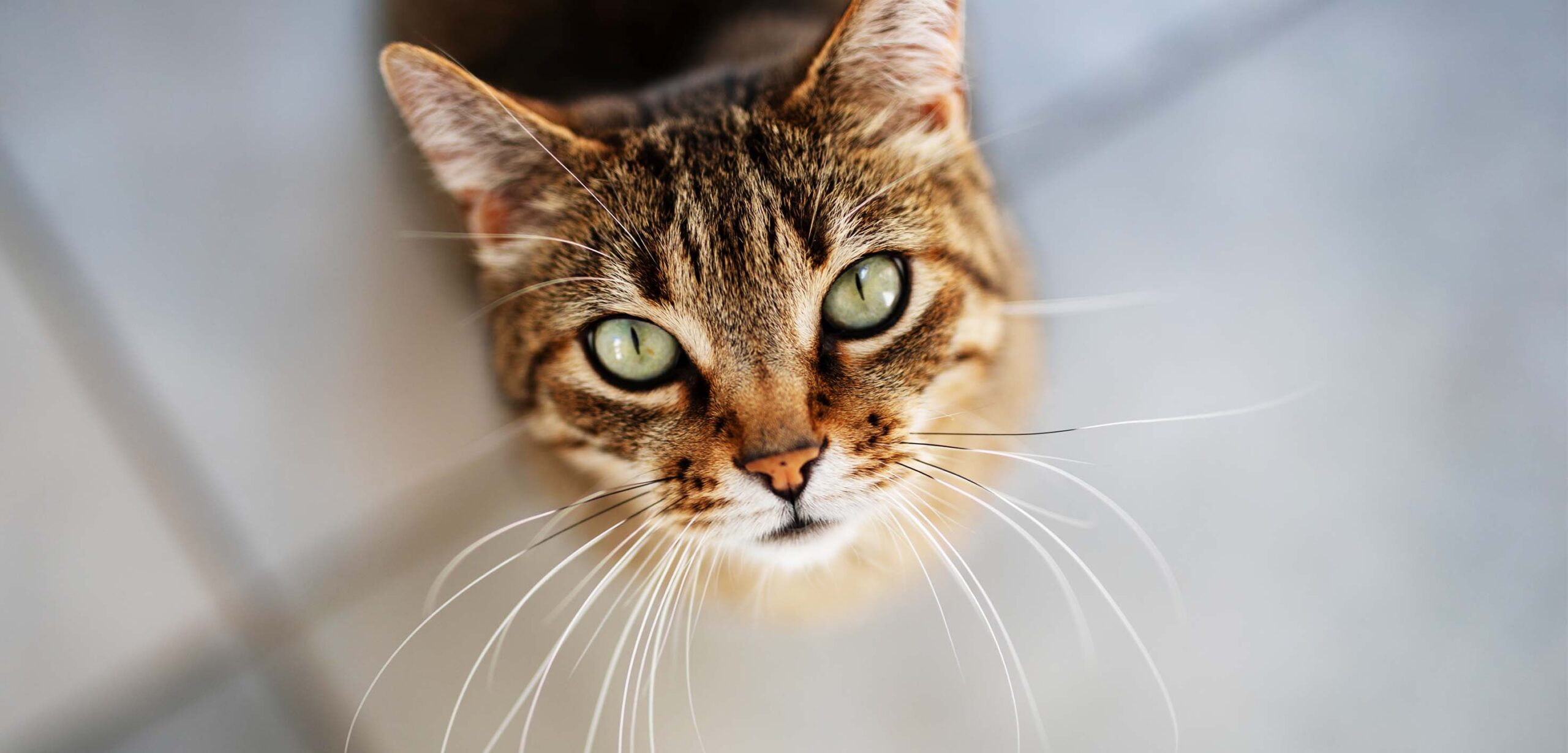When exactly does a dog NEED a probiotic? And are probiotics good for cats, too? Do they work for… gas? Constipation?
We’ll walk you through 10 of the most common signs that a four-legger needs a probiotic, so you can decide if it’s the right addition for your pet’s bowl.
On The Agenda
#1 Diarrhea
There’s a sliding scale for stool, ranging from entirely liquid to very hard/dry. You want your pet to stay away from either end– like diarrhea.
There are plenty of contributors to diarrhea, but you can help keep future bouts in check by prioritizing gut health.
#2 Gurgly Guts
Gurgling noises? That’s coming from your pet’s gut, more specifically, gas moving around in the intestines. While it’s not out of the norm for this to happen occasionally, if you can hear it consistently, they need gut support.
#3 Bad Gas
Room-clearing toots are a very apparent sign that something has gone a bit sideways with a pet’s digestion. It’s also one of the more compelling arguments for finding a solution like probiotics.

#4 An Inconsistent Poop Schedule
This can include bouts of constipation and then on and off soft stool. Adding whole food forms of fiber can offer relief in the short term, but all of these uncomfortable symptoms– from diarrhea to the inconsistent poops can be tied to an imbalanced gut microbiome.
#5 They Can’t Keep Weight On
Assuming you’ve ruled out any underlying condition with your vet, a pet who can’t keep weight on isn’t getting what they need out of the food they’re eating. And, again, this goes back to an imbalanced microbiome.
A healthy microbiome will produce digestive enzymes like protease, lipase, and a minimal amount of amylase. All these proteins are tasked with breaking down large molecules into smaller, more usable pieces. Basically, they help your pet digest and USE their food.
That’s why a quality probiotic will pair with multiple types of digestive enzymes picked specifically for carnivores.
Not only is the combination working to balance the microbiome, but elevated levels of digestive enzymes like amylase, cellulase, and other enzymes will help dogs and cats better digest the food they eat regardless of the diet you’re feeding.
#6 Your Pet Eats Kibble
If your pet eats dry food, aka kibble, they need a probiotic (and those digestive enzymes).
Kibble-based diets have such high amounts of carbohydrates or sugars (it’s needed to form those hard, crunchy nuggets), and it is a problem for a few reasons.
As carnivores, dogs and cats aren’t designed for diets with this many carbohydrates.
Dogs have very little salivary amylase (an enzyme in saliva that breaks down carbohydrates), and cats have none. So, those carbohydrates aren’t being broken down as they would in an omnivore or herbivore.

Adding extra species-specific digestive enzymes like amylase (an enzyme in saliva that breaks down carbohydrates) and cellulase (an enzyme to break down plants) will help them digest and actually use that food. And a daily probiotic (again, good bacteria) helps balance your pet’s gut microbiome for better digestion, too.
#7 You Have A Yeasty Dog
We all have some yeast in our gut already; it’s completely normal because they are members of the gut biome community. But a healthy microbiome is diverse and balanced, so if there is an overgrowth of yeast, it becomes problematic and can cause all sorts of g.i. upset.
If your pup is experiencing yeast infections in the skin or ears, that could also have come from the gut, meaning it started in the gut and invaded the rest of the body.
Flooding the gut with good bacteria can inhibit yeast growth and restore the balance to the microbiome, which eases g.i. upset too.
For a complete guide to managing yeast infections in dogs, head here.

#8 Your Cat or Dog Is Anxious
When the microbiome is healthy & balanced, so is your four-legger because the microbiome can affect mood positively or negatively. It’s true! A recent study found that an out-of-balance microbiome may be one cause of behavior issues in dogs.
You can read more about just how much the microbiome can influence mood and behavior here.
#9 Your Pet Needs Immune Support
Upwards of 85% of the immune system resides around the gut microbiome, so when the microbiome is healthy, you’ve got a healthy pet.
This is why adding healthy bacteria does so much for your whisker-toter – not just his gut health, but his body as a whole. Your pet’s immune system won’t spend so much energy keeping bad bacteria at bay, which allows their immune system to focus on other important tasks.
There is a bit of a caveat, though. Not just any probiotic will do.

The stomach is an acid pit, so if you don’t provide enough probiotics, it won’t make it to the lower g.i. tract where it really matters. It’s not only where bad gas develops but how you truly support your four-legger’s immune system.
Probiotics are measured in culture-forming units (CFUs), and you need enough CFUs of live probiotics to make it past the stomach. Based on leading research, the standard recommendation should be in the BILLIONS.
Probiotics also won’t make it without prebiotics. You can read more about why here, but what matters most is that any probiotic you add to your pet’s bowl has billions (with a “B”) of CFUs per dose and also comes with prebiotics. This probiotic-prebiotic combination is called a synbiotic, and it’s the most effective way to feed your four-legger’s gut.
#10 They Are a Dog Or Cat…
Okay, okay, this one’s a plant. But it’s only to make the point that EVERY single animal, humans included, benefit from a daily probiotic.

One study found that a combination of synbiotics and herbs not only tripled the length of a fly’s life but changed how they aged.
Since the fruit fly is surprisingly similar to mammals– about 70%– in terms of their biochemical pathways, they are a good gauge of what would happen in two-leggers and four-leggers.
Meaning a diet with synbiotics could contribute to a long and healthy life – more cuddle seshes, daily walks, and deep conversations.
Whether you’re dealing with the occasional loose pile of stool or just want to support your floof’s health, adding probiotics to the bowl will make a difference for your four-legger. Now it’s just about finding the right one.
What Makes (Or Breaks) A Probiotic
Feeding your pet’s gut with synbiotics– probiotics + prebiotics can repopulate the microbiome and balance the gut.
You have to be picky choosy about your probiotics. Many brands on the market won’t offer therapeutic levels or prebiotics, and just the presence of a probiotic is not enough.
To balance the microbiome, ease those gi issues, and truly benefit your pet, you need a probiotic that meets specific standards. We walk you through all of them in this guide– download yours here.
Share this Post

Dr. Chris Besent
Chris Bessent, DVM, MSOM, Dipl. OM, L.Ac. has over thirty years of experience in veterinary medicine including certificates in veterinary acupuncture, veterinary chiropractic and veterinary Chinese herbology. Imbued with Eastern philosophy and the knowledge that food is the foundation of health, Dr. Bessent also received her degree in veterinary nutrition and began to formulate recipes fit for a carnivore from nothing but whole foods. Currently, she divides her time between the Simple Food Project and Herbsmith, both of which are owned and operated out of her facilities in southeastern Wisconsin.

Kayla Behling - Editor
Kayla is the Content Editor for Herbsmith. She has a cat named Professor Cat-Faced Meowmers, who goes by Kitty, and a goof of a dog, named Duck. She stays busy biking trails, playing board games, and searching for the next best craft beer.




